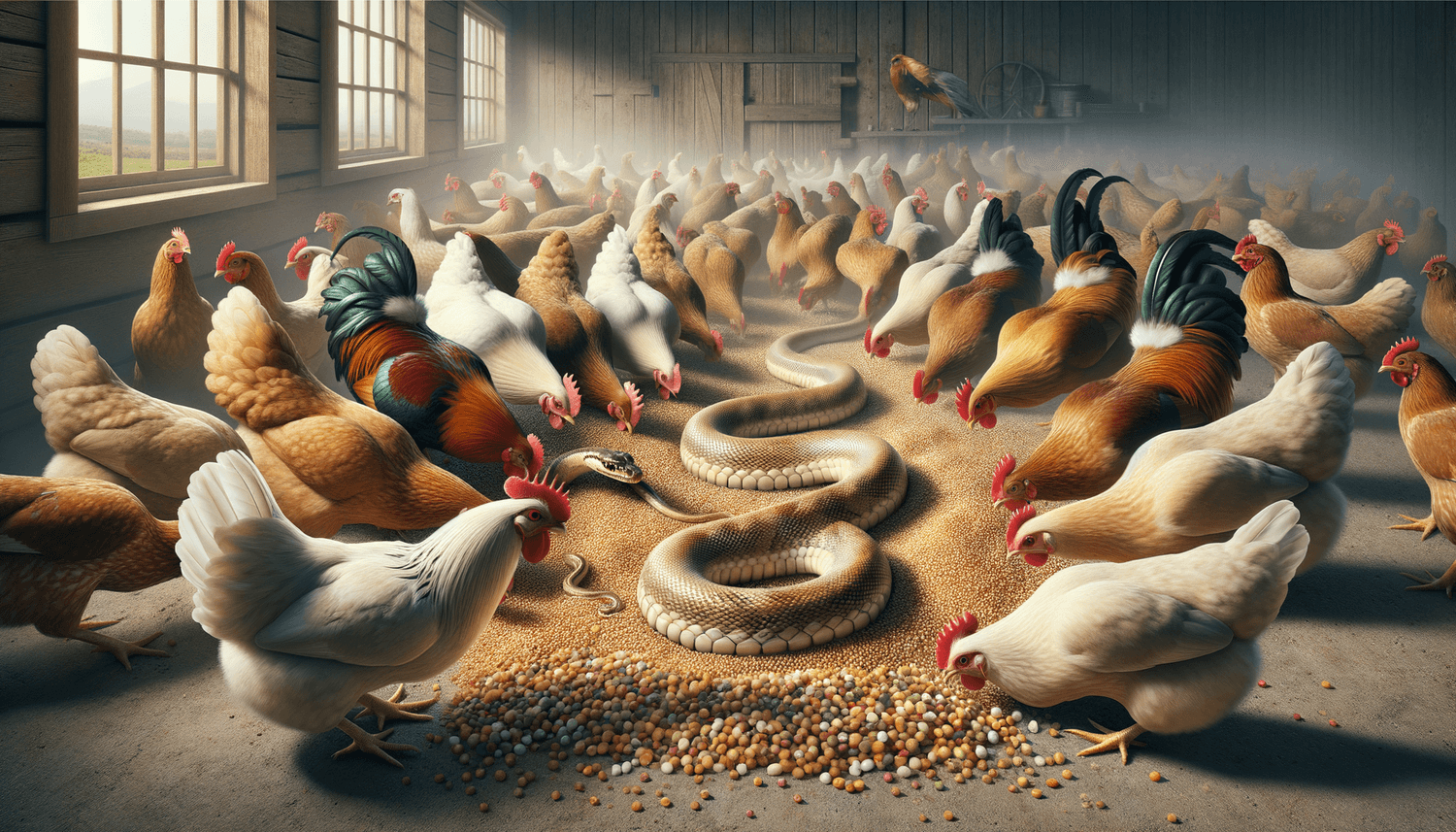Have you ever caught your feathery friends eyeing a slithery serpent with curious beaks and wondered, “Can chickens eat snakes?” Well, you’ve come to the right place to unravel this mystery! In this fun and informative blog post, we’ll be exploring whether these plucky backyard warriors can chow down on some snake snacks, the importance of a balanced diet, and all the potential benefits and/or risks that come with it. Plus, we’ll even dish out some tips on how to prepare this unusual “treat” before serving it to your beloved cluckers. Let’s dive into the world of chicks vs. snakes, and see who comes out on top!
Can chickens eat snakes?
Yes, chickens can eat snakes, and it is generally safe for them to do so. Chickens are omnivores, and their natural instincts often lead them to prey on small snakes as a source of protein. However, it is important to ensure the snake is not venomous, as this could pose a risk to your chickens’ health and safety.
A balanced diet for happy chickens
Just like humans, chickens need a balanced diet to thrive and stay healthy. Their diet should be well-rounded and provide them with all the necessary nutrients required for their various bodily functions. Providing a balanced diet is essential for the overall health and productivity of your backyard flock.
A chicken’s diet should primarily consist of high-quality chicken feed, which should make up around 80-90% of their total food intake. This carefully formulated feed contains the right balance of proteins, vitamins, minerals, and energy sources to ensure your chickens stay happy, healthy, and productive. Be sure to select a reputable brand that closely meets your chickens’ specific nutritional requirements, as different life stages and breeds may have varying needs.
The remaining 10-20% of their diet can consist of treats like fruits and vegetables, which serve to provide additional nutrients and variety. It is important, however, not to go overboard with treats. Offering too many treats can disrupt the balance provided by the chicken feed, which means your chickens may not receive all the necessary nutrients they need for optimal health.
Nutritional value of snakes for chickens.
Feeding snakes to chickens can indeed provide some nutritional benefits, particularly as a source of protein. Snakes, like other animals composed primarily of muscle tissue, are rich in proteins that help your birds build and maintain their bodies, including their feathers and egg production. Protein is an essential nutrient for chickens’ diet and should make up a sizable portion of their daily intake.
In addition to their high protein content, snakes also make for a good source of other essential nutrients, such as vitamins and minerals. For instance, they can provide a range of B vitamins that support metabolic processes and overall health in chickens, as well as minerals like calcium and phosphorus, which are vital for strong bones and eggshell formation.
Although snakes can offer a decent amount of nutrition to chickens, it is important to remember that they should be viewed as an occasional treat rather than a staple food source. Chickens should still receive the majority of their nutrition from high-quality chicken feed, which is specifically formulated to provide all the necessary nutrients to keep them healthy and productive.
Lastly, while snakes may provide some nutritional value to chickens, there is no significant hydration benefit derived from feeding snakes to your flock. Chickens should continue to have constant access to clean and fresh water to meet their hydration needs properly and ensure overall well-being.
Nutrition table of snakes for chickens.
| Information | Description |
|---|---|
| Nutritional Value | High in protein, vitamins, and minerals like calcium and phosphorus |
| Suggested Serving Size | Occasional treat; should not replace high-quality chicken feed |
| Safe Feeding Practices | Ensure the snake is not venomous and is from a safe, trusted source |
| Preparation | Deceased and properly cleaned before feeding to chickens |
| Potential Risks | Venomous snakes can pose serious health risks if ingested |
| Hydration | Snakes do not provide significant hydration; maintain access to fresh water |
| Digestion | Chickens can digest snakes, but ensure snake size is appropriate for your flock |
| Seasonal Availability | Dependent on local climate and snake population trends |
| Other Benefits | Can help satisfy chickens’ natural instincts and provides variety in their diet |
Proper food preparation for chickens
Before feeding a snake to your chickens, it’s essential to ensure it is prepared correctly. The snake should be deceased and properly cleaned. You may want to remove the head, especially if it’s a venomous snake, to prevent any risk to your chickens. Also, ensure the snake’s size is appropriate for your flock, as larger snakes might be difficult for them to consume and could pose a choking hazard.
Snake populations and helping the ecosystem
It’s always good to remember that having some snakes around your property can be beneficial, as they play a crucial role in controlling pests like rodents. Be sure to strike a balance between allowing your chickens to enjoy an occasional snake treat and preserving the ecosystem around your property. Additionally, if you live in an area where snake populations are protected or regulated, be mindful of local rules and regulations regarding snake removal or handling.
Providing environmental enrichment for your flock
While feeding snakes to your chickens can help satisfy their natural instincts and provide variety in their diet, there are other ways to keep your birds happy and stimulated. Providing environmental enrichment is essential for the well-being of your flock. Try providing perches, dust bath areas, or even toys and treat dispensers to help keep your chickens entertained and engaged. By offering your birds a range of activities and food sources, you can help maintain a content and productive flock in your backyard.

















